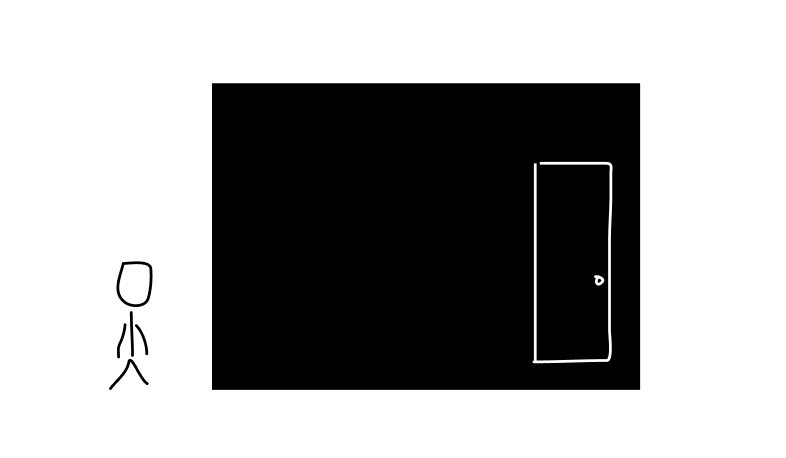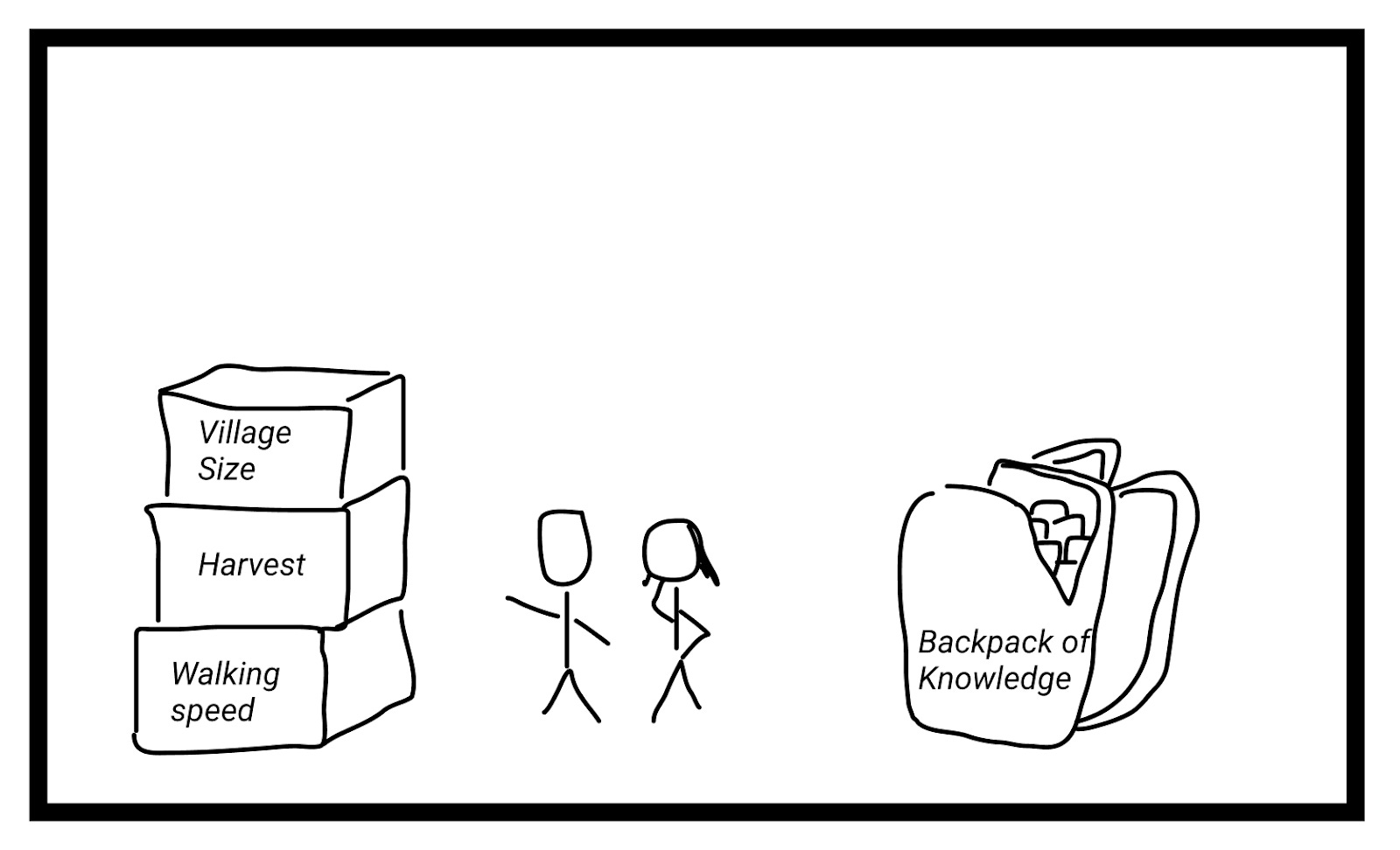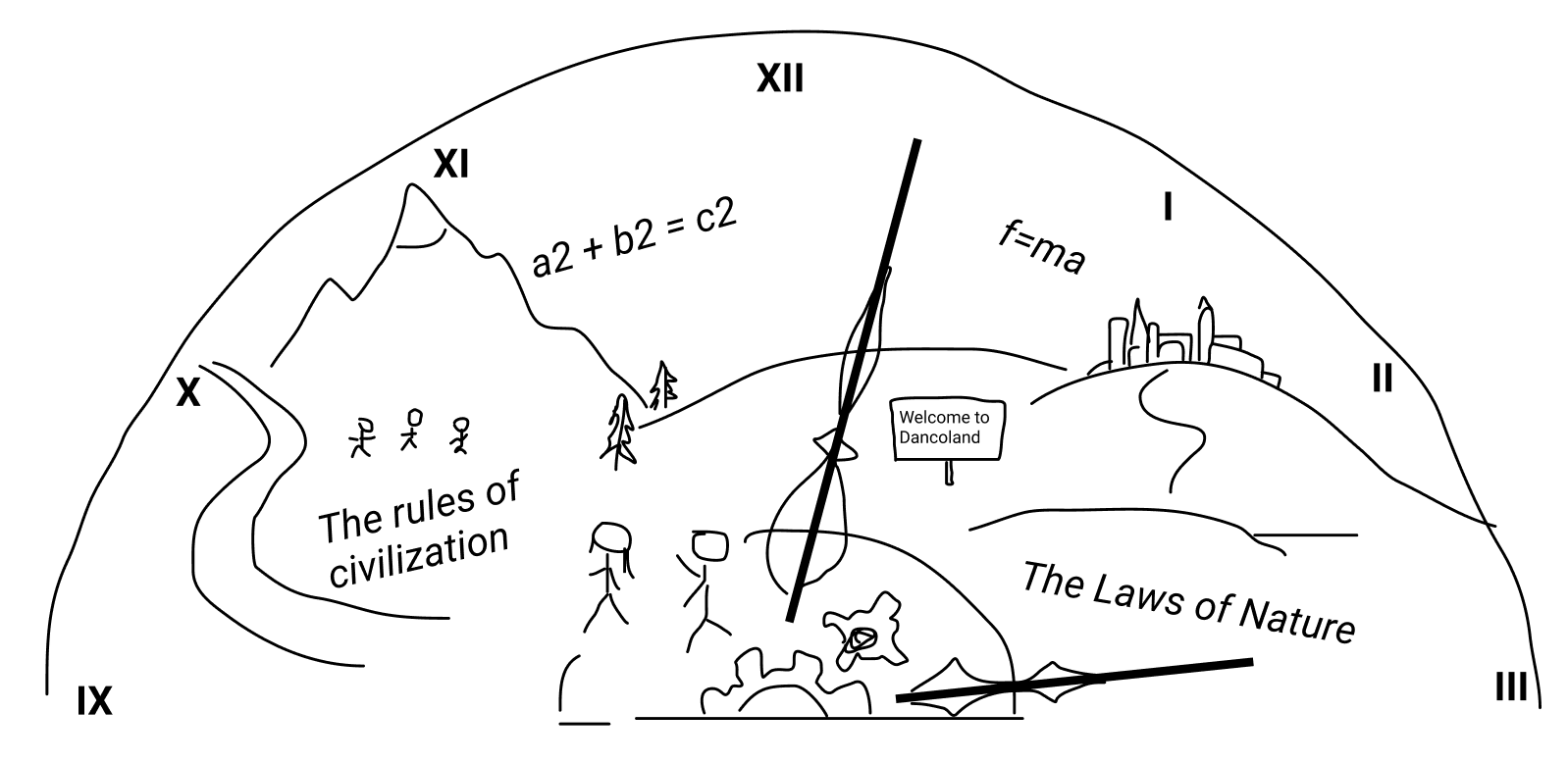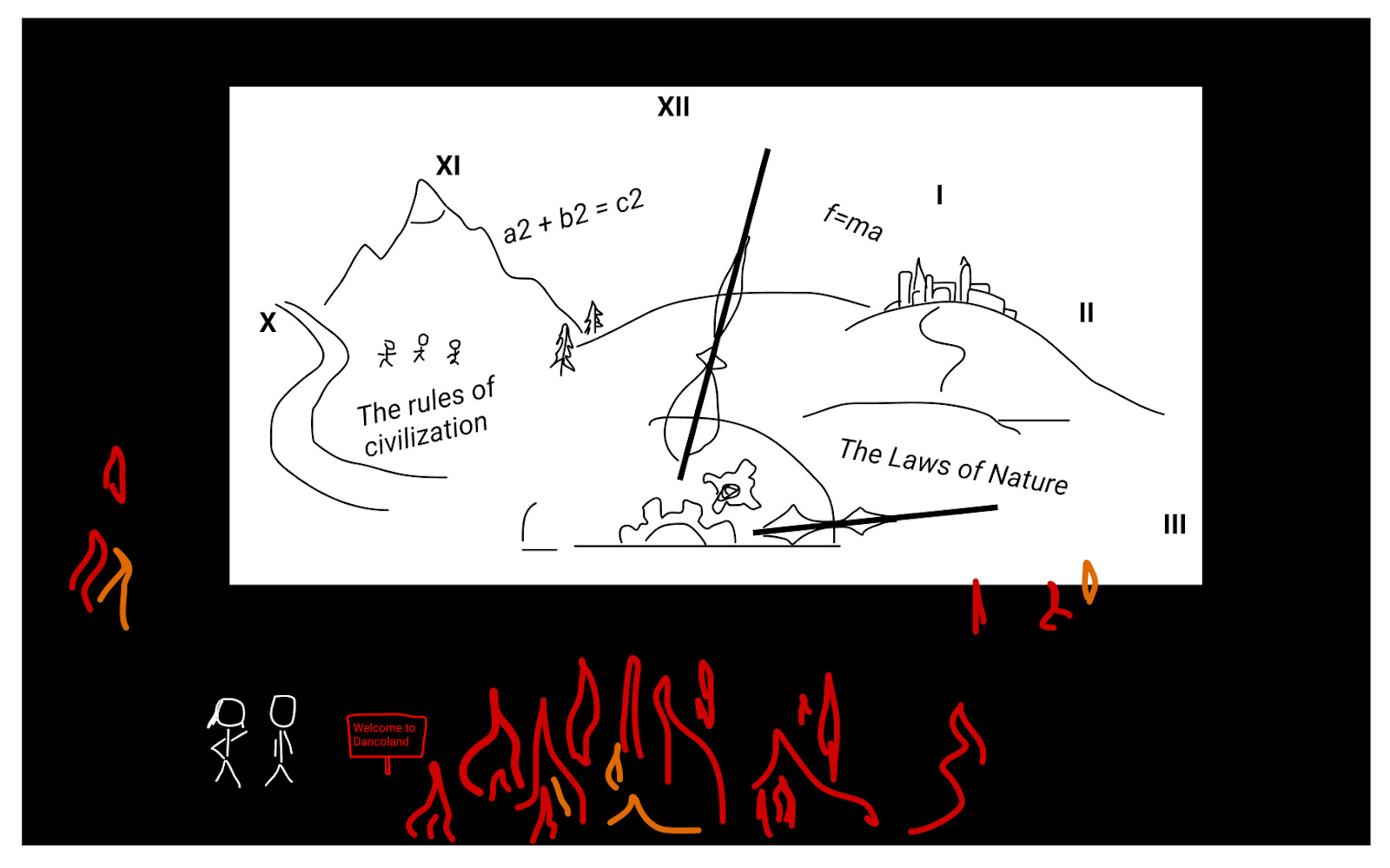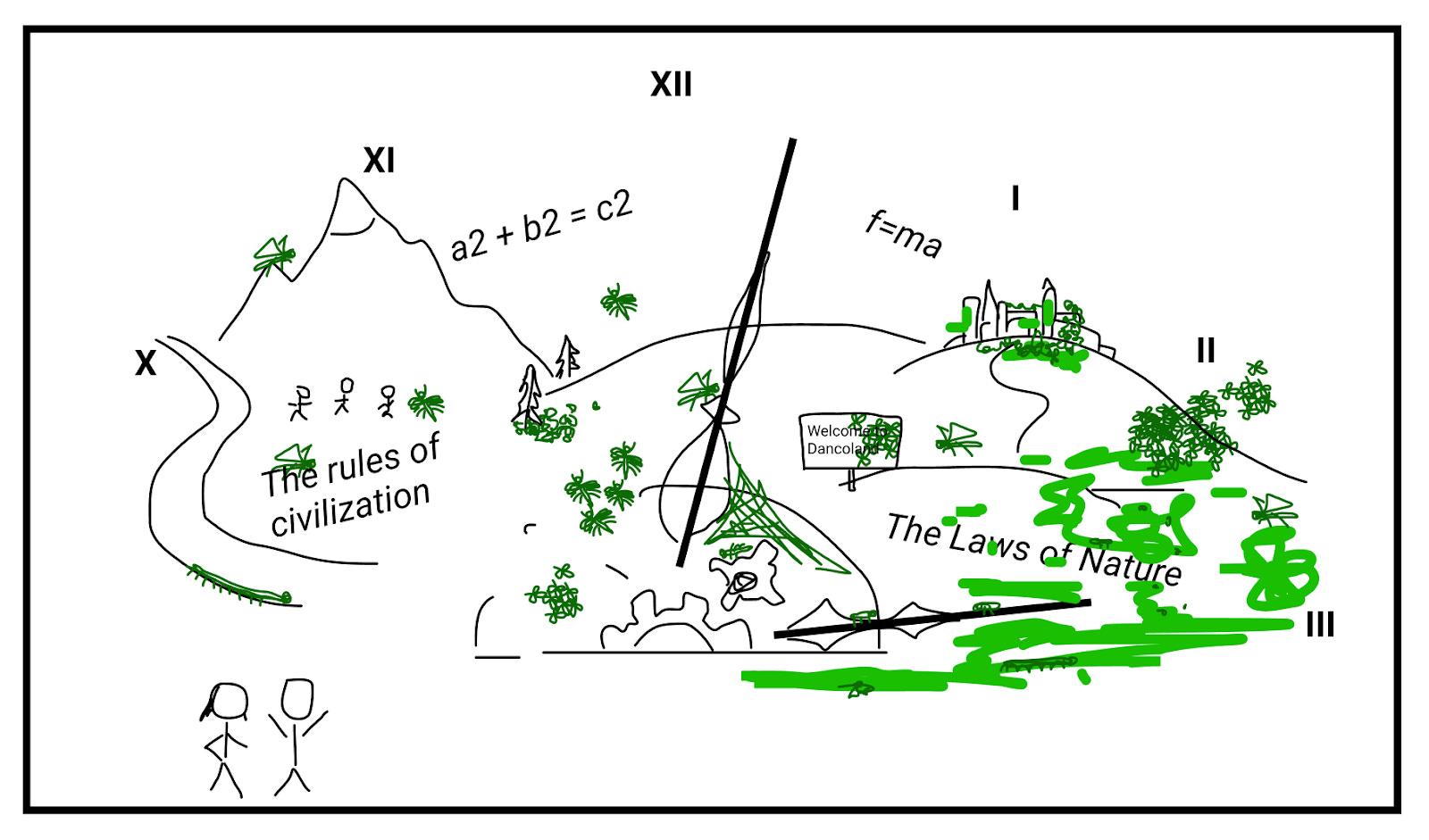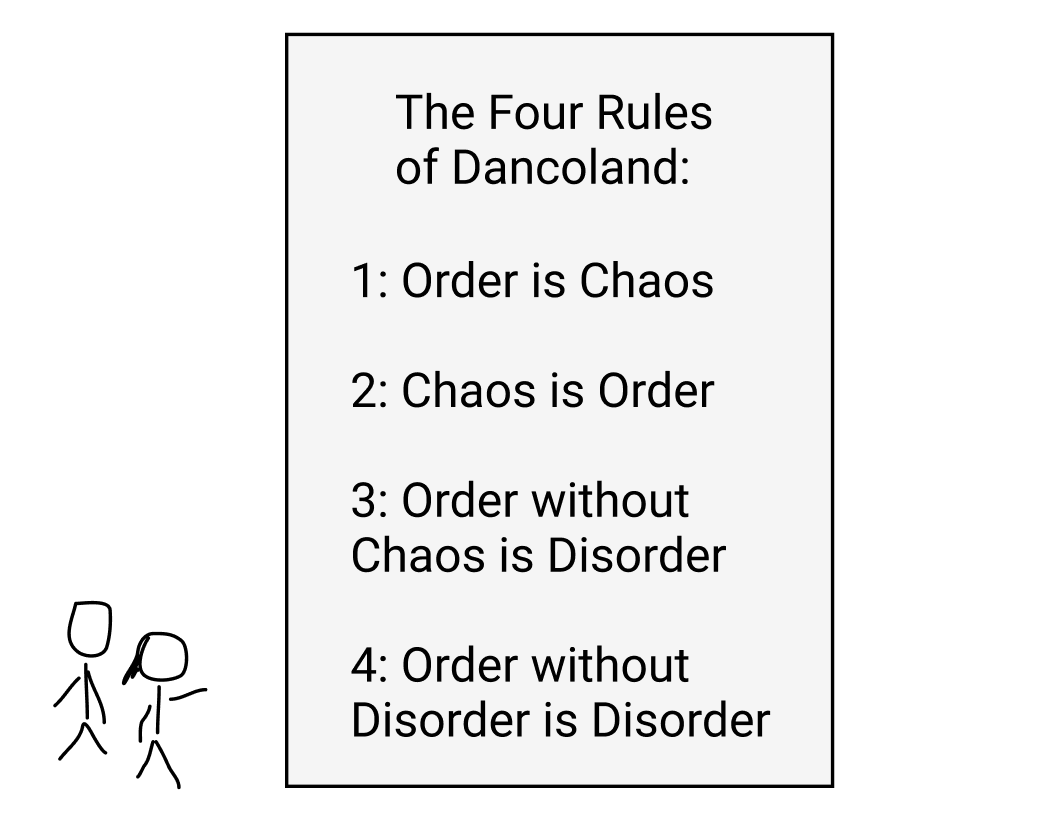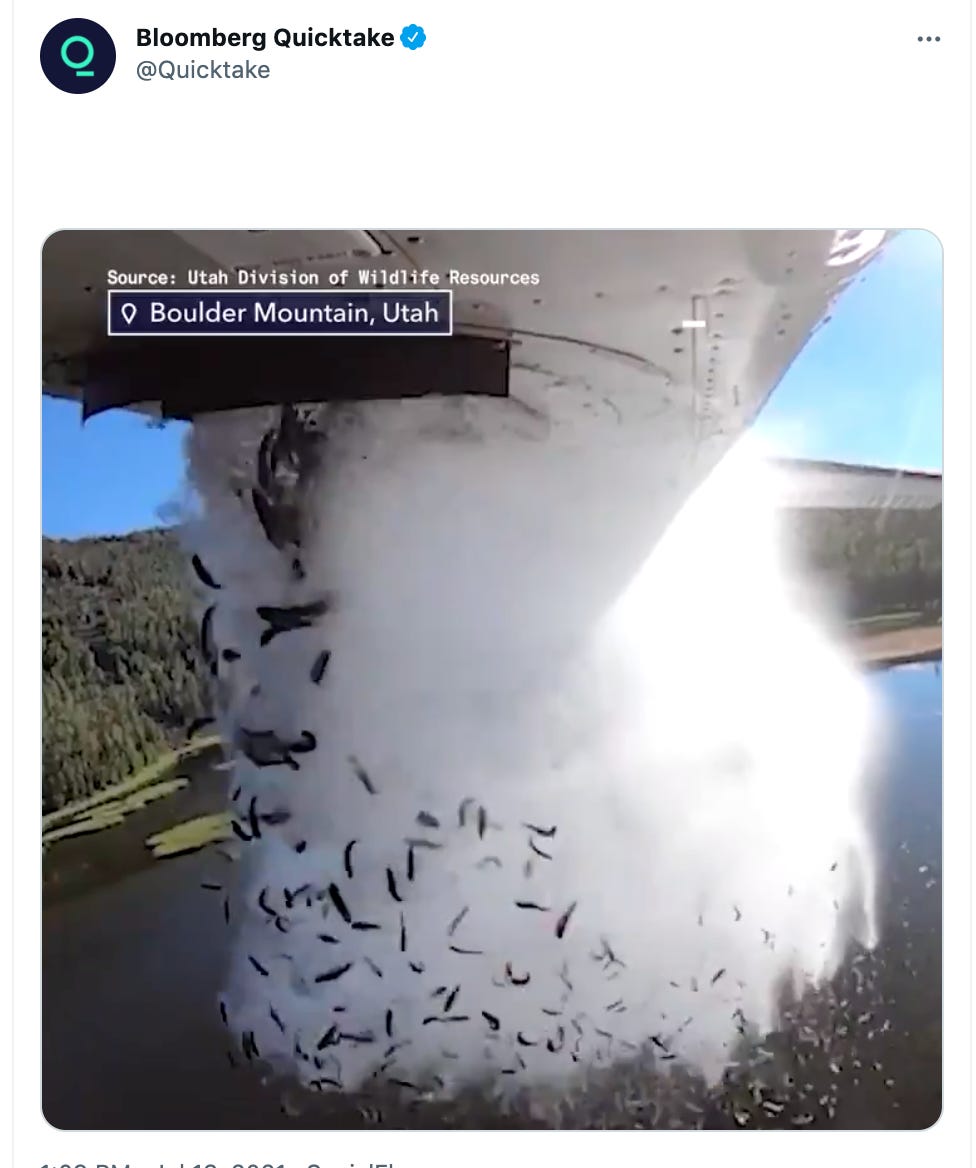Alex Danco's Newsletter - Dancoland, Part One
Are you ready? Ok, let’s begin. One night, a young man who we’ll call Student went to sleep and fell into a strange dream. Student: Huh, where am I? I don’t recognize this place. In front of him was a large black box, with a door on one side. He walked in. Inside, he found a backpack sitting on the floor. He looked inside, and found it full of little boxes, nicely packed and neatly labeled. Student: Oh, ok. I recognize some of the labels on these boxes: -The sun rises every morning and sets in the evening. -I live in a village, along with 200 other people. -It gets warm for several months, when we grow crops, and cold for months after. -My comfortable walking speed is 3-4 kilometers per hour. -I eat three meals every day. Student: I see what this is. This must be my Backpack of Knowledge. It’s the collection of everything I know, and everything I’ve learned over my life so far. He looked through the backpack for a little while, looking at all of his experience and knowledge all arranged inside it, stacked neatly inside. He opened a few of the packages of knowledge, and found familiar details. This made him happy. Then he heard someone coming. Student: Oh hello! I remember you; you were my Grade 11 Physics teacher. Nice to see you. It’s been a long time. What brings you here? Teacher: Hi there. I’m just checking in to see how you’re doing in your life-long pursuit of knowledge and understanding. What’s all this? Student: I’m glad you asked. Look at how much I know now! You must be so proud of me, knowing about so many different things. I’ve solved how all of these pieces fit together, and how one causes another, like clockwork. Teacher: Can you tell me what you mean by that? Student: Let me show you an example. See here are two boxes inside my backpack of knowledge - I comfortably walk 3-4 kilometres per hour and I live in a village of 200 people. You might wonder why those two boxes are packed next to each other, but the first one actually causes the second one. See, I live in a village, and we feed ourselves from our farmland that spreads outwards around us. Our walking speed dictates how far from our village we can cover, and therefore, the radius of ground that we can harvest. And that sets an upper bound on our village population. Therefore, he summarized proudly, given a walking speed of 3-4 km/hour, the natural size for how big our village can be is 200 people. The teacher thought by herself for a minute. Teacher: Can I show you something? Student: Of course. I’m always happy to learn new things. I’m a good learner, as you can see. They walked outside the box. The student looked around and was amazed. This world had all kinds of people, and tools, and ideas, and communities that he’d never seen before. He walked around and visited some of them. He saw a community of nomads and their horses, who were always on the move. He saw a crowded city on the sea, with an enormous market. Then he looked higher and saw much bigger ideas, and more complex forces that shaped the world. He looked around at the laws of math and physics, classically spelling out the clockwork movement of everything around him. He was amazed, and realized how small and local his own experience was. These must be universal truths, he wondered. The whole world felt like a finely crafted watch; running smoothly in balance, by laws of cause-and-effect. Student: This is so cool. I can understand so much more now that I see the bigger picture. I was silly for thinking there could be a fixed upper limit on how big villages can be, based on only walking speed! Their size must be determined by a much bigger and more complicated formula, that doesn’t only incorporate walking speed, but also lots of other things. I see why you wanted to show me all of this. I knew so little before. But now I know much more. Teacher: I’m afraid you are mistaken. You haven’t learned anything yet. Student: What do you mean? I’ve learned the laws of nature, and of civilization. I understand the whole picture now, like clockwork. What’s left for me to learn? Teacher: Let me show you something else. So they walked again, into yet again an even bigger world. This world was dark and hot. The student looked around. He could see he was inside a giant furnace. He could see the world of clockwork precision he’d left behind, now surrounded by fuel burning all around him, and slowly crumbling into spent ash. Student: What is this place? This is awful. Teacher: Oh, this? She responded cheerfully. This is the real world. We learned this in the 19th century, when we discovered entropy and the laws of thermodynamics. We see the world as structured and orderly, but that structure is temporary. Over the long run, all of the organized structure in the world slowly but irreversibly breaks down into perfectly uniform disorder. Mountains eventually grind down into dirt; plants and animals die. Friendships end, social contracts dissolve. Kingdoms eventually fall away and are forgotten. Even the sun will run out one day. It’s like that riddle from The Hobbit. Nothing survives time, in the long run. She said all of this very excitedly, like it was somehow a good thing. The student did not understand how that could possibly be good news for anybody. Teacher: I have one more thing to show you. Student: That’s fine with me; please get me out of here. This place makes me upset. They walked back towards the previous world, the one he expected ran like clockwork. But it had changed since they’d last been there. The world was now full of bugs. Teacher: See? Aren’t they wonderful? They’re evolving. The bugs were multiplying rapidly. Over in a far corner, they’d evolved arms and legs, and seemed to be building simple tools. In another corner, some of the laws of civilization and society he’d taken as hard truths were getting enthusiastically reshaped by the bugs. He could see all of the structure from before, that seemed so permanent, getting chaotically rearranged before his eyes. Teacher: In a few days, you won’t recognize any of this. It’ll have become something completely new. They’re constantly evolving more complex and specialized features and tools that give them an advantage. It’s not just the bugs that work this way, for that matter. All of society is getting more specialized, more complex, and more structured; all the time. It’s very neat. Student: I’m lost. First I told you about my little world and how I thought I understood it. So you showed me that my tiny world was actually a part of this much bigger world, with bigger laws and bigger structures. It was all new to me, but at least it made sense. But then you told me that none of those laws or facts are permanent; every organized rule and structure I take for granted will eventually run down into disorder. And now, you’re telling me the world is also getting more structured over time? That the world is constantly running up, and evolving into more complex structures and chaotic systems? Which is it? Is the world running down, or running up? Teacher: Yes. Student: What do you mean, “Yes?” Teacher: It’s all quite logical, really. Everything in this place can be explained through four simple rules. They’re written down on that sign over there. Student: Order is Chaos? Chaos is order? Order without chaos… is disorder? And order without disorder… is disorder? None of these make sense to me. I don’t understand a single one. None of them feel like they could be possibly true. Am I stupid? Is there some riddle here I’m not getting? Teacher: Don’t be discouraged. You’re making some important first steps of progress. Student: I don’t feel like I’m making progress. I feel hopelessly confused. Teacher: You’re going through an important unlearning process. You’ve been carrying around a weight this whole time, called cause-and-effect thinking. Don’t feel bad; most people carry this weight around with them. It’s uncomfortable to unlearn, and you’ve taken an important first step. If you’re willing, I’d like to invite you to think about the world in a different way. The student nodded, but still seemed upset. So the teacher led him back to their very first box, back to where he was familiar. His backpack of knowledge was still there, waiting for him. To be continued over the next 3 weeks. Before we go, here’s this week’s Tweet Caption Contest: First, congratulations to Ari from Westfield, NJ for our winning caption: “Enjoy the Galt-Free pleasure!” This week’s finalists: G. W. Bush’s nemesis be like: - n/a, from Shenzhen Ceci n’est pas une pipe - René Magritte, from Bent I am the Lorax and I speak for the trees. - Max T., from Seattle And finally, this week’s new Tweet, for your caption submissions: You can submit your responses here. Have a great week, and see you next Sunday for Dancoland, part 2. Alex If you liked this post from Alex Danco's Newsletter, why not share it? |
Older messages
Dancoland, Part 2: Just-So Stories
Monday, August 9, 2021
Welcome back to Dancoland. If you missed part one last week, read that first. Teacher: Ok, let's examine some of those things you told me about your village. I'd love to see what assumptions
Dancoland, Part 3: Thinking in Layers
Monday, August 9, 2021
Welcome back to Dancoland. If you aren't caught up, head here to start at the beginning. Last week, we'd learned how different systems can find their own steady states, and how order emerges
You Might Also Like
3-2-1: On the secret to self-control, how to live longer, and what holds people back
Thursday, February 27, 2025
“The most wisdom per word of any newsletter on the web.” 3-2-1: On the secret to self-control, how to live longer, and what holds people back read on JAMESCLEAR.COM | FEBRUARY 27, 2025 Happy 3-2-1
10 Predictions for the 2020s: Midterm report card
Thursday, February 27, 2025
In December of 2019, which feels like quite a lifetime ago, I posted ten predictions about themes I thought would be important in the 2020s. In the immediate weeks after I wrote this post, it started
Ahrefs’ Digest #220: Hidden dangers of programmatic SEO, Anthropic’s SEO strategy, and more
Thursday, February 27, 2025
Welcome to a new edition of the Ahrefs' Digest. Here's our meme of the week: — Quick search marketing news Google Business Profile now explains why your verification fails. Google launches a
58% of B2B Buyers Won't Consider You.
Thursday, February 27, 2025
Here's why, and how to fix it. ͏ ͏ ͏ ͏ ͏ ͏ ͏ ͏ ͏ ͏ ͏ ͏ ͏ ͏ ͏ ͏ ͏ ͏ ͏ ͏ ͏ ͏ ͏ ͏ ͏ ͏ ͏ ͏ ͏ ͏ ͏ ͏ ͏ ͏ ͏ ͏ ͏ ͏ ͏ ͏ ͏ ͏ ͏ ͏ ͏ ͏ ͏ ͏ ͏ ͏ ͏ ͏ ͏ ͏ ͏ ͏ ͏ ͏ ͏ ͏ ͏ ͏ ͏ ͏ ͏ ͏ ͏ ͏ ͏ ͏ ͏ ͏ ͏ ͏ ͏ ͏ ͏ ͏ ͏ ͏ ͏ ͏ ͏
Teleportation, AI Innovation, and Outgrowing 'Good Enough'
Thursday, February 27, 2025
Oxford scientists have achieved quantum teleportation of logic gates, AI advances include France's €109B investment, Unitree's eerily smooth robotic movements, and DeepMind's Veo2 video
🧙♂️ Quick question
Thursday, February 27, 2025
Virtual dry-run of my event ͏ ͏ ͏ ͏ ͏ ͏ ͏ ͏ ͏ ͏ ͏ ͏ ͏ ͏ ͏ ͏ ͏ ͏ ͏ ͏ ͏ ͏ ͏ ͏ ͏ ͏ ͏ ͏ ͏ ͏ ͏ ͏ ͏ ͏ ͏ ͏ ͏ ͏ ͏ ͏ ͏ ͏ ͏ ͏ ͏ ͏ ͏ ͏ ͏ ͏ ͏ ͏ ͏ ͏ ͏ ͏ ͏ ͏ ͏ ͏ ͏ ͏ ͏ ͏ ͏ ͏ ͏ ͏ ͏ ͏ ͏ ͏ ͏ ͏ ͏ ͏ ͏ ͏ ͏ ͏ ͏ ͏ ͏ ͏ ͏ ͏ ͏
A Classical Way to Save the Whales
Thursday, February 27, 2025
But what song, we don't know.
I'm investing in early stage AI startups
Thursday, February 27, 2025
Hi all, I'm investing in early stage AI startups. If you know someone who's looking for easy-to-fit-in checks from helpful founders (happy to provide references) I'd love to chat. Trevor
🧙♂️ [NEW] 7 Paid Sponsorship Opportunities
Thursday, February 27, 2025
Plus secret research on La-Z-Boy, Android, and OSEA Malibu ͏ ͏ ͏ ͏ ͏ ͏ ͏ ͏ ͏ ͏ ͏ ͏ ͏ ͏ ͏ ͏ ͏ ͏ ͏ ͏ ͏ ͏ ͏ ͏ ͏ ͏ ͏ ͏ ͏ ͏ ͏ ͏ ͏ ͏ ͏ ͏ ͏ ͏ ͏ ͏ ͏ ͏ ͏ ͏ ͏ ͏ ͏ ͏ ͏ ͏ ͏ ͏ ͏ ͏ ͏ ͏ ͏ ͏ ͏ ͏ ͏ ͏ ͏ ͏ ͏ ͏ ͏ ͏ ͏ ͏ ͏
• Relax with a Great Book • Book Deals • Free • KU • Paperback •
Thursday, February 27, 2025
Reading Deals Here! Fiction and Non-fiction Book Deals for You! ContentMo's Books Newsletter

